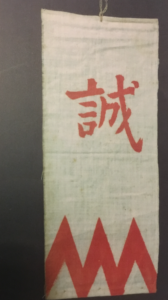
The Shinsengumi was the shogun’s paramount police force. In its attack on the Ikedaya Inn in Kyoto in the summer of 1864, the Shinsengumi foiled a planned uprising against the Bakufu, the shogun’s government, by Choshu-led rebels, who represented the so-called Imperial Loyalism movement. The rebels’ purpose was to regain the control over the Imperial Court they had lost in the coup of the previous summer, by which Choshu had been driven from Kyoto; to expel the “foreign barbarians” from Japan, which the Emperor himself desired; and to ultimately overthrow the Bakufu.
Numerous rebels including several of their leaders perished during the so-called Ikedaya Incident, many at the hands of the Shinsengumi. But Shinsengumi Commander Kondo Isami and his men were no less determined to “expel the barbarians” than the rebels themselves; nor were they any less fervent in their Imperial Loyalism.
[The photograph of the miniature Shinsengumi Banner is used in my previously published Shinsengumi: The Shogun’s Last Samurai Corps, courtesy of Hijikata Toshizo Museum.]
